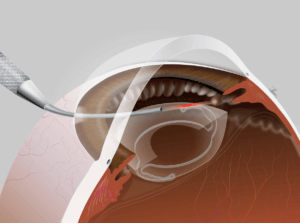ENDOSCOPIC CYCLOPHOTOCOAGULATION (ECP)
A Laser Procedure to Lower Eye Pressure
What is ECP?
ECP is a procedure in which a laser is used to alter part of the ciliary body, which lies behind part of the iris (the colored part of the eye).
How does ECP work?
The eye is constantly producing fluid through the ciliary body. When this fluid cannot leave the eye, the pressure goes up and glaucoma can result. Applying ECP laser to the ciliary body decreases fluid production in the eye and decreases eye pressure. The endoscopic instrument allows the surgeon to visualize the ciliary body, and then to treat this tissue with the laser.
 What are the steps of surgery?
What are the steps of surgery?
ECP is an outpatient procedure in the operating room. You will receive ‘twilight’ anesthesia allowing you to be comfortable for the procedure. A local numbing medication is given for the eye. The laser probe, which is about the thickness of a pen refill, is introduced into the front part of the eye through a small incision in the cornea, the clear covering of the eye. The laser probe is directed behind the iris, the colored part of the eye, to allow the surgeon to see the ciliary body tissue through the fiberoptics of the probe. The surgeon will direct the laser energy to the ciliary body to lower the pressure.
What should I expect during and after the surgery?
The procedure takes about 15 minutes and you should not feel pain during the surgery. Your eye may be mildly sore after the procedure. You will be discharged with a clear plastic shield or a patch over the operated eye. An adult will need to drive you home since you received sedative medications.
You will be given detailed instructions after your surgery that are specific to your eye’s needs. In general, the following guidelines apply. The plastic shield should be worn while sleeping for one or more weeks after surgery to protect the eye. While outside during the day, sunglasses should be worn to protect the eye from the sun and wind. For the first one to two weeks, avoid strenuous activities (running, lifting more than 10 lbs), bending, rubbing the eye, wearing eye makeup, and swimming. There are no restrictions in reading, watching TV, using your phone, tablet device, computer, etc.
Most patients will be asked to use a steroid and antibiotic eye drops. Your doctor will tell you which drops to continue using and how often at each visit depending on how your eye is doing. You will see your doctor the first day after surgery, about a week later, and a few weeks after that. Depending on how your eye heals, additional or fewer visits may be needed.
Request an Appointment TODAY
If you would like to speak with a Wills Eye representative for help finding a glaucoma physician
CALL 215-928-3197
The first few days after the surgery, vision may be worse than it was before surgery. This will improve over one to two weeks, although it can sometimes take longer. For patients whose other eye sees well, the other eye may be depended on for vision during the recovery period. Depending on your job and your other eye, you should be able to return to work within a few days to a few weeks. Limitations in physical activities at work may be needed the first one to two weeks.
After surgery, your eye may be sore, and it may feel like there is something in it, like an eyelash. The drops may burn when you put them in, and your eye may water or tear a lot. These symptoms are common but usually are mild, and improve for most people after few days. Tylenol (acetaminophen) is a good option unless you are unable to take this medication. If your eye has severe pain or sudden worsening pain or vision after surgery, please call our office or on call physician immediately.
Can I stop my glaucoma drops after ECP?
Because the full effects of the treatment will not be known until a few weeks after the procedure, you may need to continue your eye drops for a while. Sometimes patients are able to reduce the number of eye drops they are taking. Even if you are taking the same glaucoma medications after the procedure, the laser is a success if your pressure is lower. The need for eye drops long-term after this treatment varies greatly and depends on your type of glaucoma and the rate at which it is progressing.
What are some risks of the laser surgery?
All laser procedures have some risks. The ECP treatment would not be offered by your doctor unless the potential benefits outweigh the potential risks. Risks include, but are not limited to, failure of treatment, pain, inflammation, infection, loss of vision, development of an eye pressure that is too low (hypotony), unlikely but possible shrinkage of the eye, bleeding in the back part of the eye, need for additional surgery. In general, serious risks are rare. You may want to discuss the benefits and risks with your eye doctor if you have further questions.
Will ECP cure my glaucoma?
No. Glaucoma is a chronic disease that requires constant monitoring and treatment. The ECP procedure will help to lower your eye pressure. However, it will not reverse any loss of vision that has already occurred.
Does the laser procedure work for everyone?
Unfortunately, the ECP procedure does not bring everyone’s pressure down into an acceptable range with one treatment. Alternative treatments may be discussed with your physician.
For more information, please see:
American Academy of Ophthalmology patient information website
American Glaucoma Society patient information website
